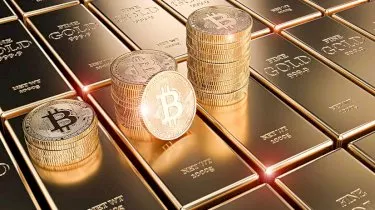Invest
Is crypto getting the shaft for a big gold re-polish?
While the spotlight shines on trendy cryptocurrencies, investors evidently haven’t lost interest in traditional and tangible commodities like precious metals.
Is crypto getting the shaft for a big gold re-polish?
While the spotlight shines on trendy cryptocurrencies, investors evidently haven’t lost interest in traditional and tangible commodities like precious metals.

As seasoned investors cheer on the recent resurgence in gold prices, the collective fever for nuggets and bullions has also lifted among investors who’ve become increasingly wary of crypto’s unpredictable shifts, according to AMP chief economist Dr Shane Oliver.
And as the threat of rising inflation, foreign military conflicts, and supply chain problems overshadows the global economy, the historically proven level of security that tangible commodities offer might be too much to ignore.
“Proponents of the cryptos were saying these were the new hedges against inflation – they’ll protect you against the debasement of fiat currencies as a result of money printing and the consequences of inflation. Whereas this year, Bitcoin has had a much rougher ride than gold has had, and gold has actually performed better, particularly in a period of share market weakness,” Dr Oliver said.
The market’s renewed gold rush has pushed its value to above US$1,950 – slightly below its 2020 high of US$2,067.

Although Russia’s military invasion of Ukraine has been described as the chief catalyst for the worldwide demand for gold, Dr Oliver feels this isn’t entirely accurate and that the fear of inflation is the real culprit.
“I think the real issue is the pick-up in inflation, which has seen an increase in demand for gold. It’s seen as a safe store of value, and there’s always a backup, if it doesn’t work out, you can melt it down when you’re got some jewellery demand,” Dr Oliver said.
Historically speaking, the link between gold and inflation ties back to earlier monetary systems.
According to Quay Global Investors, it began with the gold standard practiced by most Western monetary systems up until World War II and then continued with the Bretton-Woods agreement, which dictated a currency peg to the US dollar that was in turn pegged to the price of gold.
This ended when in 1971 the US government seized US dollar convertibility into gold, which led to other countries abandoning the peg and instead adopting flexible exchange rates, changing the relationship between gold and inflation ever since.
Using data from 1971, Quay Global looked at various levels of inflation and measured the total returns from gold. What it found is that while gold does “okay” in a low inflationary environment, delivering positive nominal and real returns, it does “better” in periods of high inflation.
And as inflationary pressures build and investors look for a hedge, Dr Oliver noted that while gold may not have the same “bandwagon” as crypto, it certainly is a strong contender.
“Gold is such an ancient investment, it’s been around for a long time, so there’s not quite the level of hype around gold as there is with crypto,” Dr Oliver said.
“I’ve never seen anything like it with crypto.”
But gold may not be such a great idea for newbies, according to the analyst.
“It’s the existing investors who stand to gain,” Dr Oliver said.
“If you got in earlier, you’d be feeling happier by now. And then speculators see it go up and they jump on the bandwagon. You can make money from doing that if you get in at the right time – early in the process that is. But if you come late to the game and the next day it drops off, then it’s a loss”.
Dr Oliver warned that while the hype created around any investment commodity can be alluring, getting in while the market is hot could potentially be the “wrong time”.
Reiterating the importance of timing, Dr Oliver noted that as central banks lift rates, gold could lose its appeal as an inflation hedge.
“There’s always this problem for inflation hedges that once central banks cotton on to the inflation problem, they start to raise interest rates, which then makes the inflation hedge less attractive, which I think is working against gold to some degree,” he said.
“The bottom line is it has I think provided a better hedge against the volatility in equity markets and a better hedge recently against inflation in the last few months than Bitcoin has, even though if you take a three-year view, Bitcoin’s fared far better.”

Commodity
Gold's remarkable surge in 2025 sets the stage for a volatile 2026
Gold has experienced a stellar year in 2025, achieving over 50 all-time highs and delivering a return exceeding 60%, making it one of the top-performing assets. This impressive performance has been ...Read more

Commodity
Scenic Eclipse launches fifth Antarctica season with new submersible, private jet transfers and helicopter experiences
Scenic Discovery Yachts has commenced its fifth Antarctica season, introducing new ultra-luxury experiences including private jet transfers, advanced helicopter excursions and a new Scenic Neptune ...Read more

Commodity
Morrison’s gas-led recovery sees manufacturers ‘held to ransom’ by gas cartel
Australia’s manufacturing sector and its workers are being ‘held to ransom’ by the gas cartel, despite the Morrison government promising cheap gas as a key policy in the COVID-19 recovery planRead more

Commodity
‘Investors should take note’: Gas-led recovery to lead to stranded assets
Australia’s gas-led economic recovery could be relying on inaccurate financial assumptions, new research has revealed. Read more

Commodity
Credibility up in flames as government opens 21 new gas and oil exploration sites
Climate groups are saying the Morrison government lacks any credibility when it comes to climate change after it announced 21 new gas and oil exploration areas. Read more

Commodity
Morrison urged to drop gas-led recovery after new global warning
The International Energy Agency has found that countries like Australia need to transition their energy grid within 14 years to reach net zero, defying Prime Minister Scott Morrison’s gas-led economic ...Read more

Commodity
Taxpayers to bear brunt of Morrison’s $2bn pledge to oil refineries
Taxpayers are set to be on the hook for up to $2 billion over the next decade as the government commits to protecting two oil refineries. Read more

Commodity
Government unveils $1bn energy deal
The Morrison government has announced a $1.1 billion energy and emissions agreement between the federal and South Australian state government. Read more

Commodity
Gold's remarkable surge in 2025 sets the stage for a volatile 2026
Gold has experienced a stellar year in 2025, achieving over 50 all-time highs and delivering a return exceeding 60%, making it one of the top-performing assets. This impressive performance has been ...Read more

Commodity
Scenic Eclipse launches fifth Antarctica season with new submersible, private jet transfers and helicopter experiences
Scenic Discovery Yachts has commenced its fifth Antarctica season, introducing new ultra-luxury experiences including private jet transfers, advanced helicopter excursions and a new Scenic Neptune ...Read more

Commodity
Morrison’s gas-led recovery sees manufacturers ‘held to ransom’ by gas cartel
Australia’s manufacturing sector and its workers are being ‘held to ransom’ by the gas cartel, despite the Morrison government promising cheap gas as a key policy in the COVID-19 recovery planRead more

Commodity
‘Investors should take note’: Gas-led recovery to lead to stranded assets
Australia’s gas-led economic recovery could be relying on inaccurate financial assumptions, new research has revealed. Read more

Commodity
Credibility up in flames as government opens 21 new gas and oil exploration sites
Climate groups are saying the Morrison government lacks any credibility when it comes to climate change after it announced 21 new gas and oil exploration areas. Read more

Commodity
Morrison urged to drop gas-led recovery after new global warning
The International Energy Agency has found that countries like Australia need to transition their energy grid within 14 years to reach net zero, defying Prime Minister Scott Morrison’s gas-led economic ...Read more

Commodity
Taxpayers to bear brunt of Morrison’s $2bn pledge to oil refineries
Taxpayers are set to be on the hook for up to $2 billion over the next decade as the government commits to protecting two oil refineries. Read more

Commodity
Government unveils $1bn energy deal
The Morrison government has announced a $1.1 billion energy and emissions agreement between the federal and South Australian state government. Read more









